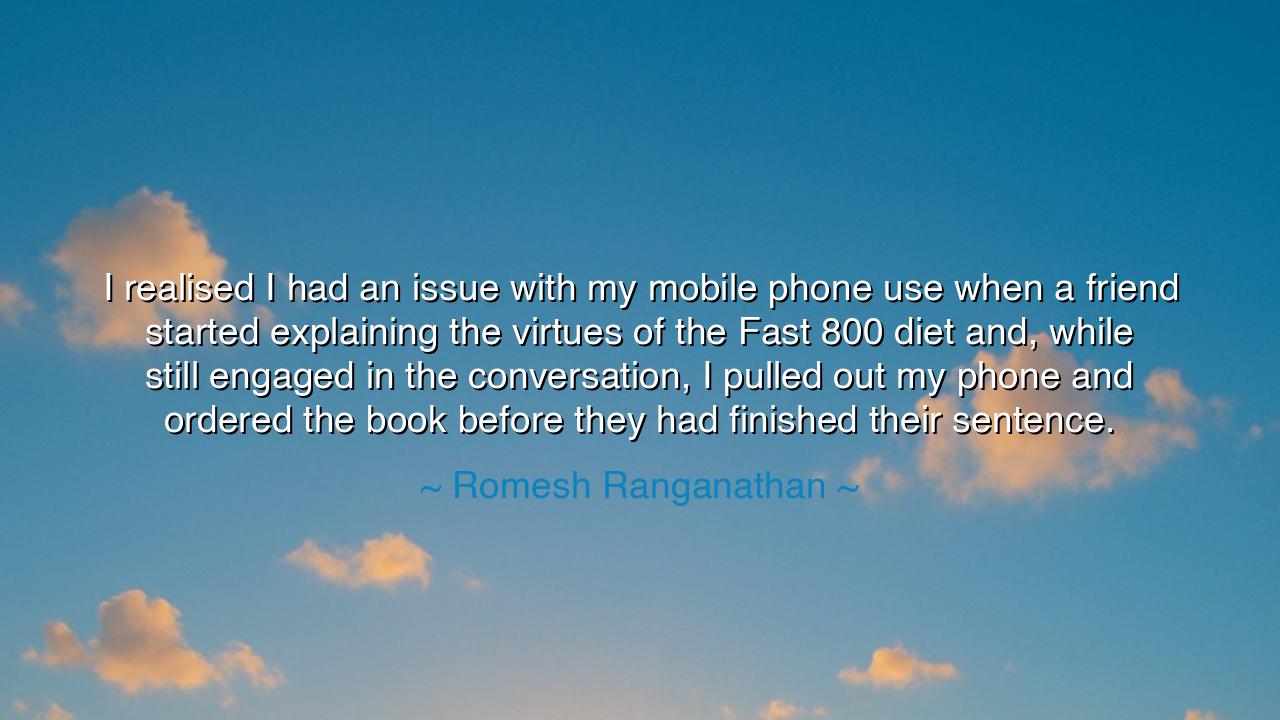
I realised I had an issue with my mobile phone use when a friend
I realised I had an issue with my mobile phone use when a friend started explaining the virtues of the Fast 800 diet and, while still engaged in the conversation, I pulled out my phone and ordered the book before they had finished their sentence.






The words of Romesh Ranganathan—“I realised I had an issue with my mobile phone use when a friend started explaining the virtues of the Fast 800 diet and, while still engaged in the conversation, I pulled out my phone and ordered the book before they had finished their sentence”—are spoken with humor, yet they echo with the quiet sorrow of modern life. Beneath their levity lies a truth both comic and tragic: that technology, which once promised connection, now often severs it. Ranganathan, a man known for wit and self-awareness, here becomes the philosopher in disguise, confessing a moment of folly that belongs not only to him but to us all. His jest reveals a deep fracture in the human spirit—the loss of presence, the surrender of patience to impulse.
To pull out a mobile phone mid-conversation is, on the surface, a trivial act; yet within it lies the story of an age. It is the gesture of a world enslaved by speed, where knowledge is valued more for its immediacy than its understanding. The ancients waited months for letters; scholars once crossed oceans for a single manuscript. But now, in a flick of a finger, we satisfy curiosity before it can ripen into reflection. Ranganathan’s anecdote, though clothed in comedy, is in truth a lament: that our minds, once vast and patient fields, have become restless streams, ever-flowing but never deep.
The origin of this wisdom comes from the collision of modern technology with the ancient human need for attention. Where once conversation was sacred—a meeting of souls—now it competes with glowing screens that beckon like false oracles. In the time of Socrates, dialogue was an act of reverence, a way to draw truth from the heart of another. But Ranganathan’s moment—ordering a book before his friend’s thought is even complete—symbolizes a deeper malady: we no longer listen to understand, but to consume. The phone, that small miracle of modern invention, has become both tool and tyrant, commanding our thoughts and breaking the fragile thread of genuine encounter.
There is a story from ancient China of the philosopher Zhuangzi, who once said that wisdom cannot dwell in a heart that is always moving. He told of a man who dipped his cup into a rushing river and found it empty, for the water had flowed past before it could be held. So it is with our minds today. We rush from one thought to the next, one notification to another, and wonder why our hearts remain unfulfilled. Ranganathan’s realization—his moment of self-awareness—is the first step toward reclaiming what Zhuangzi called stillness. It is a reminder that true learning and true living require pause, the courage to wait, to listen, to be fully present.
His confession also reveals something essential about the human soul: our yearning for control through immediacy. When Ranganathan ordered the book mid-conversation, he was not mocking his friend, but following an impulse—the need to capture knowledge before it escaped. Yet in that very act, he lost the essence of the moment—the shared laughter, the exchange of minds. We are, in this way, both masters and slaves of technology: we command it, yet it commands our attention. This paradox is the burden of the modern age, where the abundance of information has starved the richness of experience.
Consider, too, how the ancients prized discipline over desire. The Stoic Epictetus taught that freedom lies not in doing whatever we wish, but in mastering what we wish to do. He might look upon Ranganathan’s story and see a parable for our time: that each act of impulsive distraction is a small surrender of sovereignty. To reclaim our freedom, we must, as Epictetus would counsel, guard our attention as we guard our virtue. The phone is not the enemy—it is the mirror. It reflects our impatience, our fear of missing out, our hunger for control in a world that moves too quickly.
Let this be the lesson carried forward: pause before you act. When a friend speaks, let your mind rest upon their words as a bee rests upon a flower—gently, attentively, without haste. When curiosity stirs, let it mature before feeding it with a search or a click. Relearn the sacred art of listening. For in patience there is wisdom, and in presence there is peace. Humor, as Ranganathan shows us, can reveal what is most serious: the truth that we are losing touch not with knowledge, but with one another.
So let us heed the laughter of Romesh Ranganathan as the laughter of a prophet cloaked in comedy. Let it remind us that to be human is not to know everything instantly, but to feel deeply, to listen fully, and to live slowly enough to savor the gift of connection. For when we put the phone down and lift our eyes to those before us, we rediscover something older and greater than any device—the living conversation of the heart.






AAdministratorAdministrator
Welcome, honored guests. Please leave a comment, we will respond soon